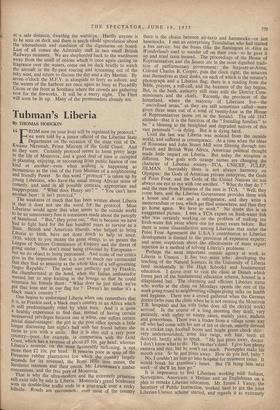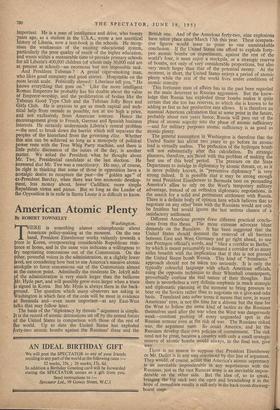Tubman's Liberia
By THOMAS HODGKIN CCROM now on your lives will be regulated by protocol," we were told by a junior official of the Liberian State Department on the occasion of the state visit of Dr. Kwame Nkrumah, Prime Minister of the Gold Coast. And so they were. Certainly protocol seems to loom pietty large in the life of Monrovia; and a good deal of time is occupied in planning, enjoying, or recovering from public beanos of one kind or another—even when nothing is happening so momentous as the visit of the First Minister of a neighbouring and friendly Power. So this word " protocol " is taken up by young Liberians, who have- the usual strong African sense of comedy, and used in all possible contexts, appropriate and inappropriate. " What does Henry say? " " You can't have another beer: it isn't protocol." The weakness of much that has been written about Liberia is that it does not see the wood for the protocol. Most Liberians would agree that what seems to the outside world to be an unnecessary fuss is sometimes made about the panoply of Statehood. " But they point out, " that is because we have had to fight hard for the last hundred years to survive as a State. British and American liberals, who helped to bring Liberia to birth, have not done much to help us since. 1930, which to you means the great slump, to us neans the League of Nations Commission of Enquiry and the threat of going under. We don't mind being criticised by Europeans— but we do object to being patronised. And some of our critics give us the impression that it is not so much our ceremonial that they find so amusing as the whole idea of a self-governing Negro Republic." The point was perfectly put by Frankie, the chambermaid at the hotel, when the Italian ambassador wanted her to stop knitting in the lounge so that he could entertain his friends there: " What does he just think we've got that lone star in our flag for ? Doesn't he realise it's a black man's country ? " One begins to understand Liberia when one remembers that it is, as Frankie said, a black man's country in an Africa which is still predominantly ruled by white men. And it is quite a healthy experience to find that, instead of having certain undeserved privileges because one is white, one suffers certain trivial disadvantages : the girl in the Post office spends a little longer discussing last night's ball with her friend before she turns to you with a smile. But it is also still a very poor country—poor, for example, in comparison with the Gold Coast, which has a revenue of about £9 10s. per head; whereas Liberia's revenue, on the most favourable reckoning, is not more than £2 10s. per head. It remains poor in spite of the Firestone rubber plantations (on which the country largely depends for its revenue), the Bomi Hills iron mines, the Stettinius interests, and their cocoa, Mr. Letourneau's timber- concessions, and the free port of Monrovia. That is why the ultra-modern and the extremely primitive still exist side by side in Liberia. Monrovia's grand boulevard with its double-line traffic ends in a goat-track over a rocky hillside. Roads are uncommon : over most of the country there is the choice between air-taxis and hammocks—or just hammocks. I met an enterprising Trinidadian who had started a bus service; but the buses (like the flamingoes in Alice in Wonderland) used to wander off on their own—so he gave it up and tried taxis instead. The proceedings of the House of Representatives and the Senate are in the most dignified tradi- tion of parliamentary government: the Serjeant-at-Arms, Colonel Charles B. Cooper, puts the clock right; the senators seat themselves at their desks, on each of which is the senator's photograph and a Liberian flag; there is a reading from the Bible, prayers, a roll-call, and the business of the day begins. But, in the bush, authority still rests with the District Com- missioners and the chiefs. Recently the provinces of the hinterland, where the majority of Liberians live—the " uncivilised areas," as they are still sometimes called—were given three seats out of a total of twenty-four in the House of Representatives (none yet in the Senate). The old 1847 attitude—that it is the function of the " founding families " to be " a blessing to the benighted and degraded natives of this vast peninsula "—is dying. But it is dying hard. Until the last war Liberia was isolated from the outside world, and suffered in consequence. At a time when the ideas of Rousseau and John Stuart Mill were filtering through into French and British West Africa, American political thought made little impact on Liberia. But today the situation is different. New gods with strange names are changing the character of Liberian society—TCA, UNICEF, JULEP, JILMAN. Inevitably there is not always harmony on Olympus : the Gods of American private enterprise, the Gods of Point Four, and the Gods of the United Nations do not always see eye to eye with one another. " What do they do ? " said the man from Firestone of the men in TCA. " Well, they come here, and the Liberian Government provides them with a house and a car and a refrigerator, and they write a memorandum or two, which get filed somewhere, and then they go home again. We have to work." No doubt this is an exaggerated picture. I met a TCA expert on fresh-water fish who was certainly working on the problem of making ten fresh-water fish swim where one (or none) swam before. But there is some dissatisfaction among Liberians that under the Point Four Agreement the U.S.A.'s contribution to Liberian development is limited to the provision of expensive experts; and some scepticism about the effectiveness of mass expert injection as a method of solving Liberia's problems. Perhaps the most important outside agency at work in Liberia is Unesco. It has two main jobs : developing the teaching of the Natural Sciences in the University of Liberia (and incidentally in the High Schools) and fundamental education. I drove over to visit the clinic at Dimeh which forms part of the fundamental education scheme, housed in a dilapidated hut. The charming and efficient Liberian nurse , who works at the clinic on Mondays spends the rest of the week going round to neighbouring villages giving talks on health and hygiene. There was a crowd gathered when the German doctor (who runs the clinic when he is not running the Monrovia T.B. hospital) and his wife (who does all the clerical work) arrived. In the course of a long morning they dealt, very patiently, with eighty or ninety cases, mainly yaws, malaria and gonorrhoea. There was a trader from a village some way , off who had come with his son of ten or eleven, smartly dressed in a cricket cap, football boots and bright green check shirt : very undernourished, arms like twigs, soft hair, teeth all decayed, hardly able to speak. " He just pines away, doctor. I don't know what to do. His mother's dead. I give him plenty cassava and rice, but he won't eat much. Pineapples make his mouth sore. So he just pines away. How do you feel, baby ? No, I couldn't let him go into hospital for treatment today. It would break his grandma's heart. But I'll bring him next week—if she'll let him go."
It is impressive to find Liberians working with Indians, Norwegians, Americans, a Haitian and an Englishman on a plan to remake Liberian education. Mr. Ernest J. Yancy, the Secretary of Public Instruction, worked hard to get the joint Liberian-Unesco scheme started, and regards it as extremely important. He is a man of intelligence and drive, who twenty years ago, as a student in the U.S.A., wrote a not uncritical history of Liberia, now a text-book in the schools. He recog- nises the weaknesses of the existing educational system, particularly the poor quality of much of the higher education, and wants within a measurable time to provide primary schools for all Liberia's 400,000 children (of whom only 30,000 odd are at present at school)—an enormous but not impossible task. And President Tubman ? A genial cigar-smoking man, who likes good company and good stories. Hospitable on the most lavish scale. Politically shrewd : Liberians tell you, " He knows everything that goes on." Like the more intelligent Roman Emperors he probably has his doubts about the value of Emperor-worship, and the proliferation of bodies like the Tubman Good Type Club and the Tubman Jolly Boys and Girls Club. He is anxious to get as much capital and tech- nical help from outside as possible, not at too high a price, and not exclusively from American sources. Hence the encouragement given to French, German and Spanish business interests. He certainly understands Liberia's central problem need to break down the barrier which still separates the peoples of the hinterland from the governing elite. Whether this aim can be achieved so long as a monopoly of political power rests with the True Whig Party machine, and there is little public discussion of the issues of the day, is another matter. We asked the President what he thought about Mr. Twe, Presidential candidate at the last election. He answered that Mr. Twe was a reactionary. He may, of course, be right in thinking that some of those in opposition have a nostalgic desire to recapture the past—the " golden age " of $x-President Barclay, when there was less economic develop- ment, less money about, fewer Cadillacs, more simple Republican virtue and pietas. But so long as the Leader of the Opposition is in exile in Sierra Leone it is difficult to know.



















































 Previous page
Previous page